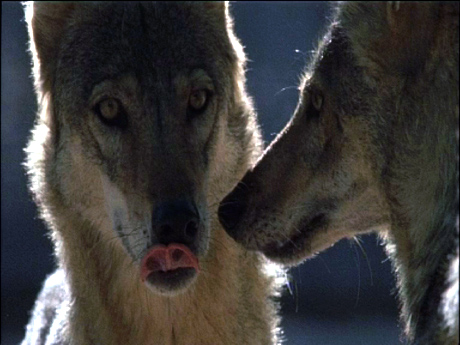Desert Wolves of India
Discover the true origins of the Indian wolf

This is a personal story told by Yadrendradev Jhala – a man passionate about wolves. The film tells the complex and intimate story of the Indian wolf and how it survives amidst a dense population of desert people and their livestock. It illustrates the importance of an age-old culture that ironically helps preserve the wildlife around it – even the wolves.
- The first film to reveal the full natural history of the wolf in India.
- Wolves denning and raising their cubs.
- Revelation of a unique life style intricately interwoven with the nomadic Rabari people of Kutch.
- Day and night photography reveals how a desert supports a surprisingly high carnivore population including wolves, hyenas, foxes and honey badgers.
- Wolf packs hunting.
- We team up with Indian biologist Dr Yadvendradev Jhala who has studied the Indian wolf for the last 15 years.
- Discover the true origins of the Indian wolf.
Producers comments
I love this film for several reasons. Firstly it looks stunning – Mark Smith’s photography is quite brilliant. When I watch it on DVD I just love the picture quality. The editing and music (the same team that did the Ultimate Guide to Tigers) also set this film apart from many other films. Andy Netley did a wonderful job editing the film and David Mitcham’s music, performed by the BBC Philharmonic Orchestra, is outstanding. If you want to hear some of David’s award winning music for Danger in Tiger Paradise and Wolves visit davidmitcham.com.
Background
Mike Birkhead (Producer and Director) has made 15 films in India (including Land of the Tiger 6 x 50, the Wild Bunch, Leopard Hunters, Danger in Tiger Paradise, and the Last Tusker) on many different species but one animal has always fascinated him and for the most part eluded him – the Indian Wolf - a rare and shy creature with a mixed reputation. In the mid 1990s the Indian wolf suddenly hit the headlines for all the wrong reasons. It became a notorious man-eater on a par with other much larger and more dangerous predators such as the leopard and tiger. All the stories Mike read seemed too sensational and not factually based.
To reveal the truth, Mike sought the expertise of Dr Yadvendradev Jhala, a scientist from the Wildlife Institute of India. He had been studying Indian wolves for 15 years. First they discussed the man-eaters and any previous films on these wolves. Jhala assured Mike these cases were indeed overstated and sensationalised – man-eating was extremely rare and many of the reported incidents were probably not connected with wolves at all. Yes, there had been a few tragic incidents but man-eating wolves were not for Mike. Jhala had been working to reveal the true nature of the Indian wolf. Mike decided he wanted to make a film that would help redress the balance and paint a true picture of the biology and social behaviour of the Desert Wolves of India. Mike always appreciated Rudyard Kipling for portraying Akela the wolf and his pack in Jungle Book as the good guys.
Mike had to find an exceptional photographer to work with - he knew who he wanted. Mark Smith is an Emmy Award winning photographer (for 'Flying Devils' - about the striated caracara of the Falklands). He and Mike had worked together before on 'Land of the Tiger' and on a film about the Asian Elephant ('The Last Tusker'). In fact Mike had first heard about Mark after he made a beautiful film in Western India close to where Jhala’s wolves were. Mark was the first choice and the ideal man for the job.
The film looks stunning – unique desert wolves, desert landscapes and colourful Rabari people; timelapse and night photography provide novelty. This film is put together with a sense of energy and vibrancy and beautifully edited by Andy Netley. It is enhanced by outstanding music from the award winning composer David Mitcham and performed by The Royal Philharmonic Orchestra, Pete Lockett (percussion) and Mark Johns (guitar).
The location
Kutch (meaning turtle in Kutchi) is a dome-shaped land mass, cut off from mainland India by a swamp desert called the Little Rann of Kutch and from Pakistan by the Great Rann of Kutch and the delta swamps of the River Indus. Here most of the people are cattle herders or merchants. The majority of the herders are nomadic Rabari moving large numbers of camels, sheep and goats in search of pasture. The animals are used for the production of milk, ghee and manure, or for use as draft animals – not for human consumption. The region’s main religions are Hinduism and Jainism (and Islam in Kutch). All Jains and the majority of Hindus are vegetarian and both religions prohibit the slaughter of cattle and other livestock. Malnourished and old cattle are kept in special camps and cared for.
Summary
Desert Wolves of India
India - a land well known for its tigers and elephants but few people realise that wolves occur here too. The Rabari herdsmen of western India share their land with packs of wolves - they have no love for the animal – they are at war.
An intimate story of the Indian wolf and how it survives amidst a dense population of desert people and their livestock. It illustrates the importance of an age-old culture which helps preserve the wildlife around it – even the wolves.
Producer: Mike Birkhead
Photography: Mark Smith
Editor: Andy Netley
Music: David Mitcham
Dubbing Editor: Paul Clarke
Series Editor: Tim Martin
Our Programmes